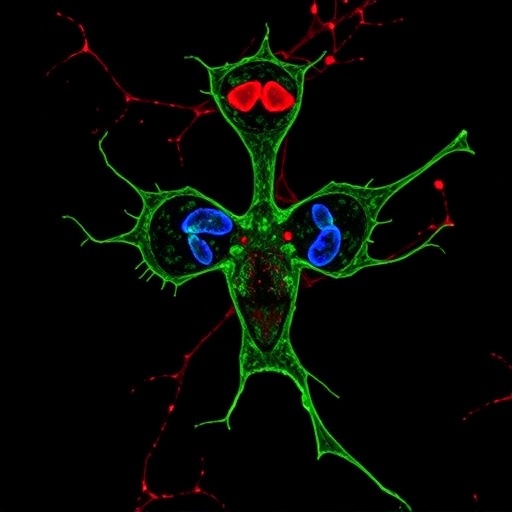In a groundbreaking study published in the Journal of Biomedical Science, researchers have unveiled a novel mechanism that significantly enhances anti-tumor immune responses in the tumor microenvironment of triple-negative breast cancer (TNBC) models. This study, led by Chan et al., investigates the role of CD24a, a glycoprotein implicated in various cellular processes, including immune evasion in cancer. By knocking out CD24a, the authors demonstrate a conspicuous improvement in macrophage and CD8+ T cell activities, stirring significant interest in the potential of this therapeutic strategy for cancer immunotherapy.
CD24a is known to act as a checkpoint molecule that dampens immune responses, particularly in the context of tumors. In standard conditions, its expression on tumor cells serves to obscure these cells from the immune system. This study’s finding that knockout of CD24a augments macrophage activity is groundbreaking, as it suggests a novel avenue for overcoming immune evasion tactics employed by cancerous cells. The implications of this research reach beyond breast cancer, suggesting that a deeper understanding of CD24a’s role could impact various cancer types.
The researchers utilized a murine model of triple-negative breast cancer, a subtype characterized by aggressive behavior and limited treatment options. By employing CRISPR-Cas9 technology, the team effectively generated CD24a knockout mice, allowing them to observe the immune dynamics in a controlled setting. The results indicated a robust activation of macrophages following the depletion of CD24a, leading to heightened phagocytic activity and cytokine release.
Intriguingly, the study also notes a significant enhancement of CD8+ T cell responses in the CD24a knockout group. CD8+ T cells are crucial for targeting and destroying cancer cells, and their increased functionality in the presence of altered CD24a expression provides a compelling rationale for exploring CD24a as a therapeutic target. The finding is particularly noteworthy, given that CD8+ T cells are often rendered dysfunctional in the tumor microenvironment due to various inhibitory signals.
Yet, these newfound immune responses were not merely anecdotal. The researchers employed a series of assays to quantitatively measure the immune cell proliferation and activity. Their findings pointed to a substantial increase in tumor-infiltrating lymphocytes (TILs) in the CD24a knockout mice, suggesting that the removal of this inhibitory signal prompts a favorable shift in the immune landscape of the tumor microenvironment.
The study is timely given the ongoing challenges associated with TNBC, a subtype that often lacks effective targeted therapies due to its complex biology. The increase in anti-tumor immunity observed through CD24a knockout could pave the way for novel immunotherapeutic interventions that can synergize with existing treatments, potentially changing the clinical landscape for TNBC patients.
Several critical pathways were implicated in the study, elucidating the mechanisms by which enhanced immune responses were facilitated under CD24a-deficient conditions. The interplay between macrophages, which act as antigen-presenting cells, and CD8+ T cells is of particular interest. By elucidating these pathways, future research might identify additional targets that can be modulated to further amplify the immune response against tumors.
As for future directions, the authors emphasize the need for clinical trials to evaluate the safety and efficacy of targeting CD24a in human patients. The transition from murine models to human applications invariably presents challenges, including the optimization of delivery methods for potential therapeutic agents. Nonetheless, the groundwork laid by this study offers promising possibilities for innovative cancer treatments.
In understanding the potential therapeutic implications, it’s essential to consider that the tumor microenvironment plays a pivotal role in determining the success of immunotherapy. The enhanced macrophage and T cell activation observed in this research indicates that targeting immunosuppressive pathways can fundamentally reshape the response of immune cells within the tumor microenvironment.
Moreover, the collaborative nature of cancer therapy may mark a new horizon in precision medicine. Combination therapies that concurrently target CD24a while stimulating other immune pathways could yield improved outcomes in combating TNBC and perhaps even other malignancies. This multifaceted approach to cancer treatment is supported by the study’s insights and aligns with the growing trend toward personalized medicine in oncology.
This research, thus, holds potent implications for the future of cancer immunotherapy. By elucidating how CD24a knockout can prime immune cells for a more aggressive attack on tumors, the authors provide a roadmap for subsequent investigations aimed at translating these findings into clinical applications that could benefit patients suffering from breast cancer and beyond.
In conclusion, Chan et al.’s research underscores the importance of delving deeper into the mechanisms of immune evasion in cancer. As they shine a light on CD24a as a potential therapeutic target, they inspire hope for the development of more effective immune-based strategies against one of the most challenging cancer types. Overall, this study not only enriches our understanding of the immune landscape in cancer but also encourages the rethinking of therapeutic paradigms in breast cancer.
Subject of Research: CD24a knockout and its impact on anti-tumor immune responses in triple-negative breast cancer.
Article Title: CD24a knockout results in an enhanced macrophage- and CD8⁺ T cell-mediated anti-tumor immune responses in tumor microenvironment in a murine triple-negative breast cancer model.
Article References:
Chan, SH., Lin, CY., Tseng, HJ. et al. CD24a knockout results in an enhanced macrophage- and CD8⁺ T cell-mediated anti-tumor immune responses in tumor microenvironment in a murine triple-negative breast cancer model.
J Biomed Sci 32, 73 (2025). https://doi.org/10.1186/s12929-025-01165-3
Image Credits: AI Generated
DOI: 10.1186/s12929-025-01165-3
Keywords: CD24a, triple-negative breast cancer, macrophages, CD8+ T cells, immune response, immunotherapy, murine model.




